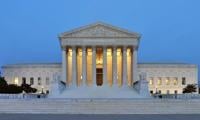
AUGUSTA, Maine – The state’s highest court has upheld a ruling that says the wording of a voter identification ballot initiative is fine.
The Maine Supreme Judicial Court issued its ruling July 11, saying the ballot question proposing changes to state voting laws meets the required state standards.
Earlier this year, the group Voter ID for ME filed a court challenge to the wording of the ballot issue written by Secretary of State Shenna Bellows’ office “misrepresents the ballot question.”
Here is how the question reads on the ballot: “Do you want to change Maine election laws to eliminate two days of absentee voting, prohibit requests for absentee ballots by phone or family members, end ongoing absentee voter status for seniors and people with disabilities, ban prepaid postage on absentee ballot return envelopes, limit the number of drop boxes, require voters to show certain photo ID before voting, and make other changes to our elections?”
Last month, a Superior court judge ruled the question met state standards. The Supreme Judicial Court agreed.
State law requires ballot questions to be clear, concise and easily understandable. Code says they must be “understandable to a reasonable voter reading the question for the first time and will not mislead a reasonable voter who understands the proposed legislation into voting contrary to that voters’ wishes.”
Voter ID for ME says the question is too long and said the highlighting of changes to absentee voting rather than focusing on a requirement for voters to present a photo ID when they go to vote is confusing. The group said it is concerned voters will have difficulty understanding the question on the ballot.
While admitting the ballot question is longer than most, the Supreme Judicial Court justices said the language of the question is not incomprehensible or misleading.
Bellows was pleased with the ruling.
“I take seriously my constitutional responsibility to write referendum questions as clearly and understandably as possible,” she said. “I’m pleased that the Superior Court ruled that the ballot question regarding changes to Maine election laws met the standards set forth in Maine law.”








